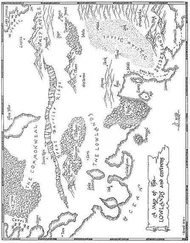The spiders were emerging then, racing along the curve of the hull with a speed that laughed at Karst’s plodding progress. Others were steering down from above, where they had been drifting at the end of more thread, climbing up against the outwards force of the rotating section; climbing to where they could leap on Karst and his men.
Karst’s upraised gun/glove, at the corner of his camera, flashed and flared, trying to track the new targets, killing at least one. They saw one of Karst’s people being hit by friendly fire, boots torn off the hull by the impact, falling away from the ship to end up jerking on the end of an unseen line, as an eight-legged monster came inching up towards his helpless, flailing form. Men and women were shouting, shooting, screaming, trying to run away at their leaden, crippled pace.
Karst stumbled back two heavy paces, still shooting, seeing his helmet display record the remaining rounds in his helical magazine. More by luck than judgement, he picked one of the creatures off as it alighted on the woman next to him, spraying freezing pieces of carapace and viscera that rattled as they bounced off him. She was caught in the webbing the little bastards had seeded the hull with, just great loose clouds of the fine stuff that had half his people now completely ensnared.
His ears were full of people shouting: his team, others from inside the ship, even Lain. He tried to remember how to shut down the channels: it was all too loud; he couldn’t think. The thunder of his own hoarse breathing roared over it, like a hyperventilating giant bellowing at each ear.
He saw another of his people fly loose from the hull, cancelling the grip of his boots without anything else to secure him. He just flew away, ascending into the infinite. If his suit had thrusters, they weren’t working now. The luckless man just kept going, receding into the infinite, as though he just could not abide to share the ship with the busy monsters intent on getting inside it.
Another spider landed on the trapped woman beside Karst, just sailing in at the end of a colossal leap, its legs outstretched. He could hear her screaming, and he stumbled forwards, trying to aim at the thing as the woman flailed and bludgeoned at it with her gloved hands.
It was clinging to her, and Karst saw it carefully line up its mouthparts, or some mechanism attached to them, and then hunch forwards, lancing her between the plates of her suit with sudden, irresistible force.
The suit would seal around a puncture, of course, but that would not help against whatever she had been injected with. Karst tried to call up medical information from her suit, but he could not remember how. She had gone still, just swaying limply against the anchor point of her magnetic boots. Whatever it was, it was quick-acting.
He finally managed to turn off all the voices in his head, leaving only his own. There was a moment of blessed calm in which it seemed possible, somehow, that he could regain control of the situation. There would be some magic word, some infinitely efficacious command that a truly gifted leader could give, one that would restore the rightful arrow of evolution and allow humanity to triumph over these aberrations.
Something landed on his back.
Like an ant colony , is Portia’s thought. It is not true, though, just something she tells herself to counter the vastly alien surroundings that weigh upon her.
She comes from a city that is a forest, filled with complex many-sided spaces, and yet the architects of her people have cut even that three-dimensional geography down to their own size, compartmentalizing the vast until it is manageable, controllable. Here, the giants have done the same, making chambers that for them are perhaps a little cramped and constricting, but to Portia the exaggerated scale of it all is frightening, a constant reminder of the sheer size and physical power of the godlike beings that created this place, and whose descendants dwell here still.
Worse is the relentless geometry of it. Portia is used to a city of a thousand angles, a chain of walls and floors and ceilings strung at every possible slant, a world of taut silk that can be taken down and put back up, divided and subdivided and endlessly tailored to suit. The giants must live their lives amongst these rigid, unvarying right angles, entombed between these massive, solid walls. Nothing makes any attempt to mimic nature. Instead, everything is held in the iron hand of that dominating alien aesthetic.
Her peer group is through the savaged shuttle-bay doors, the breach sealed up behind them to minimize pressure loss. She has just had a brief window of radio contact with other groups, a hurried catch-up before the giants change their own frequency and obliterate all the others with their invisible storm. There are six separate peer groups within the great ship now, several of them in a section that had no air of its own. Attempts to coordinate are hopeless. Every troop is on its own.
They encounter the first defenders shortly afterwards: perhaps twenty giants arriving with violent intent before the spiders can set up their large-scale weapons. The vibrations of the enemy’s approach serves as forewarning of an almost absurd degree, and Portia’s band – a dozen of them now – are able to set an ambush. A hastily woven spring trap catches the front-running giants in a mess of poorly constructed webbing – not enough to hold them for long, but enough to drag them to a stop where their fellows will crash into them. They have weapons – not just the lethally swift projectiles of their compatriots outside, but also a kind of focused vibration that runs like mad screaming through every fibre of Portia’s body, shocking all the spiders into motionlessness, and killing one outright.
Then the spiders begin shooting back. The weapons slung beneath their bodies are far slower than bullets, closer to the ancient slingshots Portia’s ancestors used. Their ammunition is three-pronged glass darts, formed to spin in flight. Here, in gravity, their range is relatively short, but the interior of the Gilgamesh does not allow for much long-distance marksmanship anyway. Portia and her peers are, at the very least, extremely good shots, excellent judges of distance and relative motion. Some of the giants wear armour like those outside; most do not.
When the darts draw blood, they snap, tips shearing off and their contents being forced into the curiously elaborate circulatory systems the giants boast, to be hurried about their bodies by their own racing metabolisms. Only a tiny amount is needed for full effect, and the carefully measured concoction works very swiftly, going straight for the brain. Portia watches the giants drop, spasming and going rigid, one by one. The few armoured enemy are dealt with by the more risky approach of direct injection. Portia loses four of her squad and knows that, if the ambush had failed, they might all have died.
Still, their numbers within the ship are growing steadily. Whilst she would rather survive, she has always accepted the reasonable chance that this mission would mean her death.
Her field-chemist is still alive and ready for orders. Portia does not stint. The Messenger said there will be vents to allow circulation of air about the vessel. The precise logistics of keeping the living quarters of an ark ship supplied with breathable air are somewhat beyond Portia’s understanding, but Avrana Kern’s information has been understood to the degree required.
Their hairy bodies sensitive to movement even through their vacuum coating, the spiders quickly track down the faint motion of air from the vents. Out there, Portia knows, there will be armies of giants mustering, no doubt expecting the spiders to come against them. But that is not the plan.
Читать дальше












